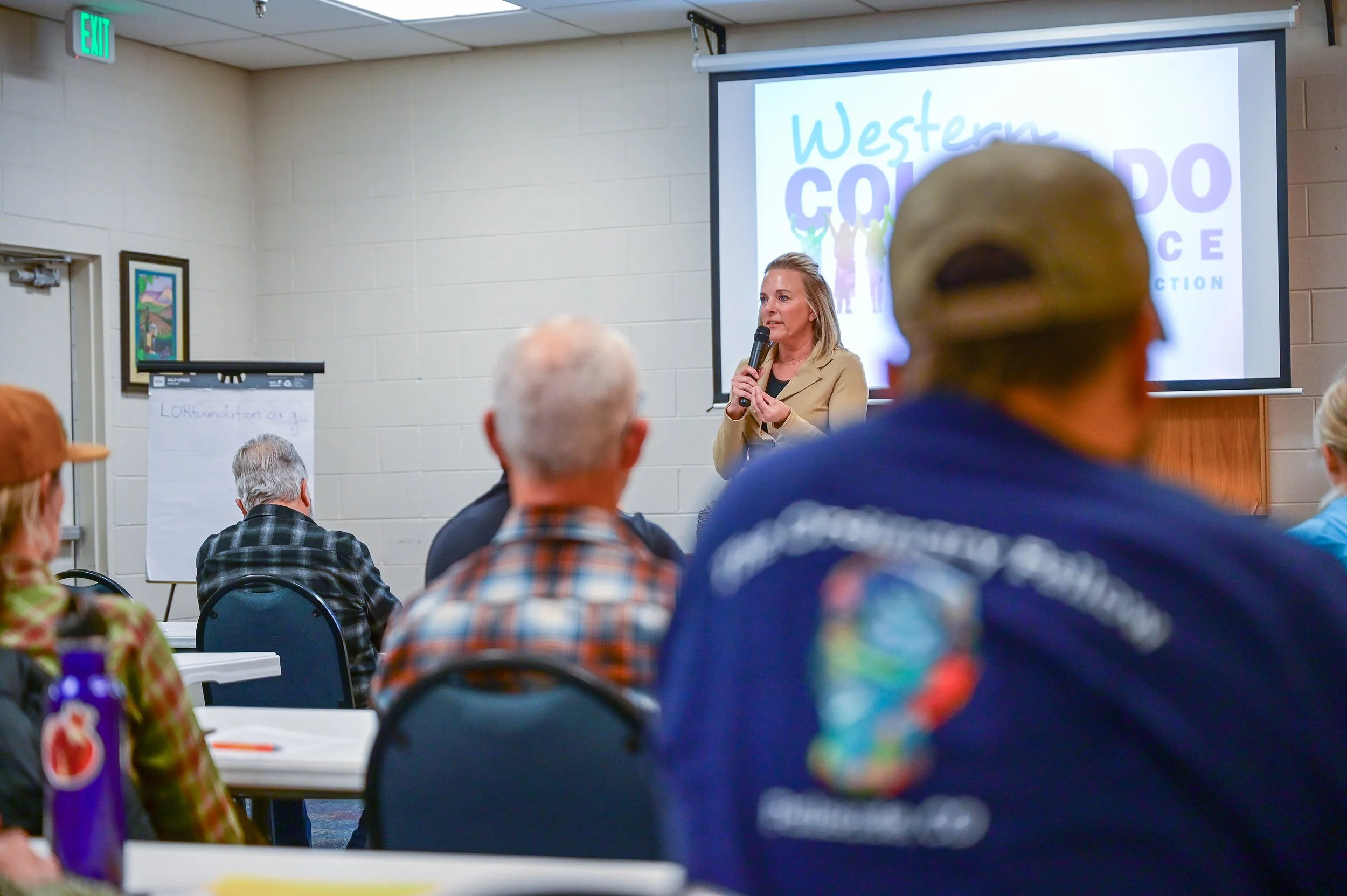Western Colorado Alliance leaders host first of its kind grant-writing workshop for farmers
Mastering grant writing has emerged as a vital skill for farmers and ranchers, nearly as crucial as comprehending soil health or navigating deals with processors. Through WCA's workshops, individuals gain the expertise needed to strengthen their operations and expand the agricultural landscape within their communities.
On a cool November evening in 2023, 50 western Colorado farmers came together in Grand Junction to learn about one of the most important techniques in modern farming: grant writing. Community members, mostly beginning or small-scale farmers, quickly filed into Colorado Mesa University Tech’s event space, eager to learn how to apply and receive grants that will help their operations thrive in a very competitive market. Hosted by Western Colorado Alliance leaders Sabra O’Crotty and Katie Radavich with help from organizer Nick Allan, the workshops taught the ins and outs of grants for farmers including common pitfalls, available grants, important keywords and more.
“Since I started farming, one of the biggest hurdles has been organizing farmers to work together and communicate with each other to ensure everyone is successful here in the valley,” explained Dawn Adams, owner-operator of Green Junction Farmstead.
Jennie Aubert and Illene Roggensack, seasoned grant writers, kicked off the workshop by guiding attendees on assessing the compatibility of grants with their farming projects. “Grant Writing has been one of my biggest obstacles,” said Dawn. “I have not been granted many, because of the time consumption, the jargon, and the things that are required, just because it's not something a farmer often does. I always advocate for some type of workshop or avenue for small guys to get that help.” Attendees were prompted to call out what kind of projects and equipment they were looking to get funded through grants. Everything from greenhouses and land access, to housing for farm help was called out across the audience. The workshop's information packet, courtesy of the Western Colorado Alliance, offered insightful examples of the kind of questions farmers should consider asking to ensure alignment between the grant and their project goals.
Many farmers struggle to secure funding and land access. Winning grants empowers farmers to innovate, expand operations, and contribute to the resilience and growth of their communities' agricultural landscape. Attendees of the workshop varied from seasoned farmers to some who were just starting out along with some who had received grants in the past and those who were just learning about farming grants for the first time. "Grants from federal, state or private institutions are literal investments to improve communities and diversify economies,” said produce farmer and business owner, Michael Lobato. “Grants that I have been awarded have done just that; they have created a community around what I am doing, created two part-time jobs and an ag technology startup that we are continuing to build and gain momentum to this day. I have told all of my grantors that if we are to ever prosper from our technology startup, I intend to return that favor 10-fold so that these grants programs can keep going to fund other great ideas and projects.”
Later that evening, a panel featuring representatives from various grant-awarding organizations presented on the grants available to farmers and answered questions from the attendees. The panel included William Brownlee of the U.S. Department of Agriculture’s National Resource Conservation Service (NRCS), Ashley Garrison from the Colorado Water Conservation Board (CWCB), and Daniel Reed from the LOR Foundation, focused on community solutions and local conservation initiatives. “A really big benefit for me was getting to meet William from the NRCS,” Tomek Barc of Happy Hive Farms explained. “ He's the guy I've been trying to get a hold of for the last few weeks. And so it was really nice to put a name to a face. He's one of the nicest people you can ever expect. And all of the presenters were really forthcoming with great information.”
Participants networked and shared experiences during the dinner break, which a local farm provided.
Each panelist delved into their organization's criteria for evaluating grant submissions. They unanimously advised farmers to establish connections with the organization's personnel to align their grant proposals effectively, emphasizing that these relationships distinguish applicants. Additionally, they highlighted the importance of partnerships with nonprofits or organizations, often essential or advantageous in certain grant applications. Strategic planning and a well-structured project timeline were underscored as fundamental aspects for successful funding endeavors.
The event was the first of its kind for the Western Colorado Alliance but perhaps not the last, “I think that Mesa County here and especially here on the western slope, there's a lot of small ag coming up,” said Dawn. “So I'm hoping that we can have a second group that is more designed around smaller farms.”
Dr. Kathryn Beddell shares her personal experience in writing grants for agriculture.
From seasoned farmers to newcomers, attendees voiced their needs and aspirations, highlighting the importance of accessible support in navigating the grant landscape. The event's success and the expressed desire for more tailored workshops underscored the community's need for continued guidance and collaboration in advancing agricultural pursuits in the region. This event showcased the vital role of grant writing in empowering farmers, highlighting its significance in farming success in this new era of agriculture.



